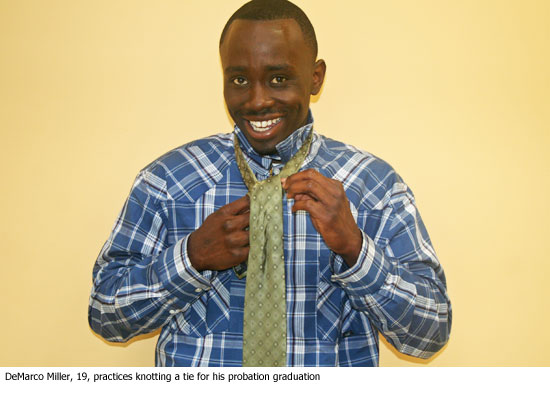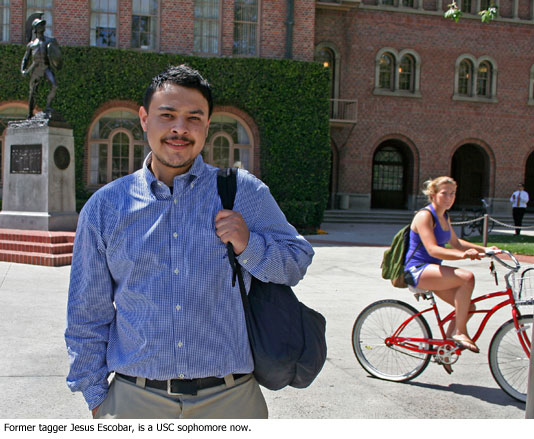Young probationers get lessons for life
May 5, 2010
When DeMarco Miller left L.A. County jail last fall at the age of 18 with a felony burglary conviction, his chances for rehabilitation didn’t look good.
The South L.A. youth was a member of the Crips. He faced three years’ probation for stealing a student’s cell phone. He hadn’t finished high school and he’d never held a job. Monthly meetings with his probation officer were cursory and unproductive.
But since January, Miller, now 19, has begun to turn his life around thanks to an innovative pilot program that provides high-risk young probationers with concentrated doses of skills training, behavior modification classes and job preparation.
On Friday, Miller will be one of 36 young adult probationers graduating from the Adult Day Reporting Center, housed in a one-time furniture factory on south San Pedro Street. So far, 79 young probationers have graduated from the program since its inception in late 2008.
The other day, Miller and some of his fellow probationers gathered for a graduation-preparation session, where they struggled with one small but telling symbol of the new direction of their lives—a necktie. “Where does this part go?” Miller asked sheepishly, holding up the broad end of a green tie, which was provided by probation officials, who are also lining up graduation suits.
The former gang member says that, only months ago, he would never have envisioned himself getting all dressed up with someplace truly important to go. Miller credits the program with giving him a sense of his potential.
“I’m glad I got sent here,” says Miller, who started in January and now hopes to be placed in a job in construction. “I didn’t like it at first, but then I’d go home with a happy attitude every day. I learned to be more mature. You’ve got to work before you can eat.”
The premise of the program is that young at-risk probationers can avoid future trouble¬—and hard time in prison—if they learn social and behavioral skills that life on the streets failed to teach them. Six probation officers lead classes in motivation, teaching social skills, moral reasoning and anger management. Incoming probationers are assessed for their educational, substance abuse and mental health needs. Students, who come three to five days a week, move at their own pace, taking six to nine months to finish the program.
“A lot of our clients are guys with state prison hanging over their heads,” says Edward Sykes, a supervising deputy probation officer who runs the center’s day-to-day operations. “If we can get these guys to change the way they think, they can begin to move away from gang membership and crime on their own.”
Probation officials say they’re not discouraged by the fact that the graduation rate remains low and that participation can be spotty. Of the 230 who have been enrolled, more than 25% never showed up for classes or left because of new arrests. Probation officials say they are so committed to the program that they’ll find additional funding when a $5 million state grant expires in August—even if they have to cut parts of the program.
“We’re committed to keeping it operational,” says Cal Remington, the department’s acting chief deputy probation officer. Come 2011, new state funding will arrive, with plans by the department to expand the pilot program.
Probationers are involuntarily assigned to the program by judges or probation officers after felony convictions for crimes ranging from assault and robbery to burglary and drug sales. Sex offenders and probationers convicted of gun-related crimes are barred. About half are gang members. Probation officers proudly note that the San Pedro Street center has been free from gang fighting.
The prospect of employment is the program’s biggest carrot. Graduates have been placed in building maintenance, hotel hospitality, food service, carpentry and other construction work. Some even have become ushers for Cirque de Soleil, says Erick Cerda, the program’s employment resource coordinator. On Fridays, visitors from various workplaces meet with groups of probations to share their job experiences.
Probation officers assigned to the Adult Day Reporting Center are given a lower caseload, meaning they can develop deeper relationships with their charges, many of whom, like Jesus Escobar, appreciate the extra support.
Escobar was a tagger convicted in 2008 of defacing Metro buses with his “SHOTS” signature. Before he was assigned to the program, he says, his first probation officer was too jammed to spend time. “It was ‘hi’ and ‘bye’,” Escobar, now 22, recalls.
But Escobar was determined to finish high school and enroll at the University of Southern California, which he knew mainly from riding bikes nearby as a kid. When he was assigned to the Day Reporting Center, he got the push he needed.
His new probation officer, Gabriel Perez, encouraged Escobar to take community college classes and apply to USC last year. A day before Escobar’s graduation from the probation program in May, 2009, he learned that he’d be a Trojan.
Escobar is now a sophomore, studying sociology and political science and aiming to become an attorney. He says he “still feels a little weird” on campus and is shy about reaching out because of his background. He suspects there aren’t many students like him who arrive at school every day on public transportation from Watts.
“None of this would have happened for me if it hadn’t been for this probation program,” Escobar says while strolling with a visitor on the USC campus. “They believed in me.”
Posted 5/5/10














 405 bridge work causes a stink
405 bridge work causes a stink
